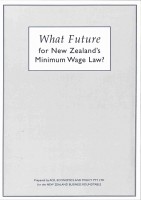
What Future for New Zealand's Minimum Wage Law?
This report addresses the question of what should become of New Zealand's minimum wage law. Read more

You searched Publications for "" and got 263 results

This report addresses the question of what should become of New Zealand's minimum wage law. Read more
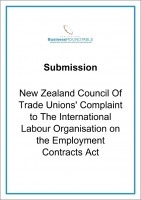
I have been asked to review issues raised by the International Labour Organisation ('the ILO') in response to a complaint ('the complaint') dated 8 February 1993 made by the New Zealand Council of Trade Unions ('the NZCTU'). In substance the complaint is that the Employment Contracts Act 1991 (NZ) ('the Act'), which came into operation on 15 May 1991, does not accord with principles adopted by the ILO in relation to freedom of association and collective bargaining. Read more
A year ago the New Zealand Business Roundtable published the ACIL report Agricultural Marketing Regulation: Reality versus Doctrine. Since then its conclusions have been widely debated and there have been developments in each of the five major industries studied. Read more
The 1990s are destined to be a decade of profound and potentially beneficial change in the New Zealand economy. The process of structural reform is well advanced and is laying the foundations for a significant and sustained reversal of our inferior economic performance. Read more
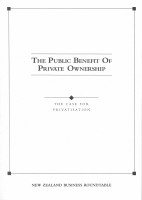
The New Zealand experience with requiring state-owned enterprises (SOEs) to be run as successful businesses demonstrates that high quality reforms can generate enormous gains in productivity, product quality and profitability - along with lower (real) prices for consumers. Nevertheless, the gains were always likely to be limited by the difficulties involved in: * applying full commercial disciplines when state industries do not have to succeed to survive; * providing risk capital to SOEs when fiscal constraints and/or political considerations may conflict with commercial goals; * making the competitive environment genuinely neutral, when continuing government ownership brings with it the possibility of future state bail-outs; and * maintaining the early gains in the face of the political pressures to weaken the commercial disciplines which were put in place when the SOEs were first formed. Read more
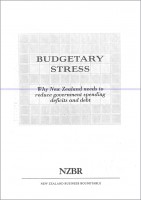
This report examines New Zealand’s fiscal policy in the context of wider policies aimed at restructuring the economy in order to raise income and employment levels, and outlines the desirable directions of fiscal policy over the medium term. Read more

The NZBR's interest in the Financial Reporting Bill (the Bill) stems from its desire to promote policies which will enhance the efficiency of New Zealand's equity and debt markets. These markets play a key role in allocating resources among alternative uses and they facilitate competition for the control of large publicly-held companies. Read more

The Bill is designed to provide a legal framework for the operation of the proposed Takeover Panel, including the formation of a takeover 'code'. In addition, the Bill offers some generalised guidelines to the Panel in its tasks and provides for enforcement of compliance with any code devised by the Panel and approved by the Minister of Justice. Read more
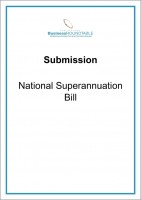
The general analysis on which our comments are based is an NZBR study, Retirement Income Provision, which sought to address the retirement income issue in a comprehensive way. The central finding of this study was that the future welfare of retired New Zealanders is fundamentally dependent on an increased output of goods and services from the economy. Read more
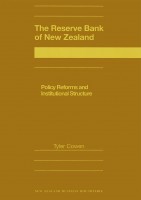
Fighting inflation is and should be a primary goal of the Reserve Bank. Inflation decreases the incentive to save, misallocates resources, interacts with the tax system in pernicious ways, distorts the information conveyed by market prices, increases uncertainty, and redistributes income arbitrarily. Read more